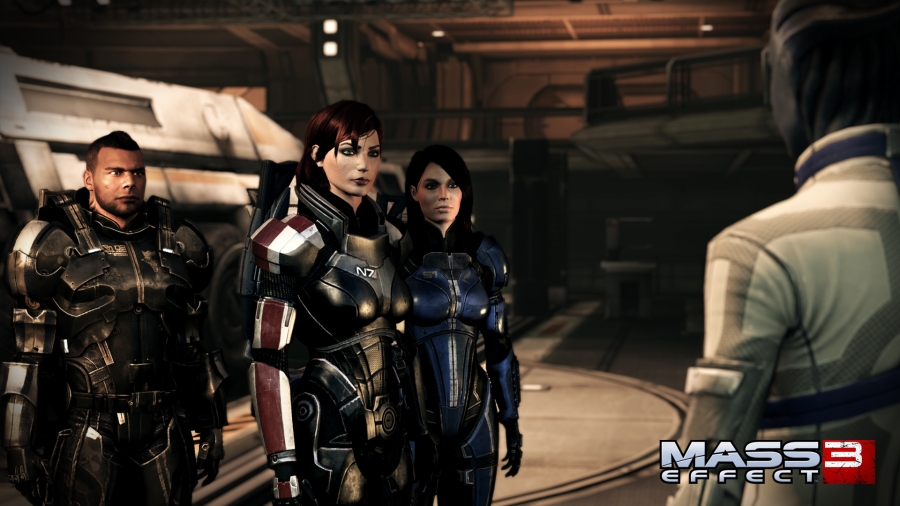Mass Effect series

- Developer: BioWare Edge of Reality Demiurge Studios
- Publisher: Microsoft Studios Electronic Arts
- Year: 2007 – 2012
- Genre: RPG Shooter
- Platform/s: Various
The Mass Effect series causes some mixed feelings. For some, it offers fantastic representations of sexuality. A respondent to the Queer Representation (2016) survey said that Mass Effect is their favourite because of the variety you are able to show: you can be an asexual Commander Shepard and focus on the mission; you can be gay or bisexual, depending on who you are interested in; you can pursue multiple relationships or even have sex without bothering to invest in romance.
Mass Effect has traditionally included a number of same-gender relationship options, but with the inclusion of two openly gay characters in Mass Effect 3, both the man and woman protagonist options (John and Jane Shepard, respectively) can now romance a character who is not simply playersexual. These gay characters—Samantha Traynor and Steve Cortez—are joined by Kaidan Alenko who, though restricted to being only a romance option for Jane Shepard in Mass Effect and Mass Effect 2, is also romanceable by John Shepard in Mass Effect 3; this gives the player another man/man same-gender relationship option. The coming out narrative of Kaiden is of interest to many people in terms of representation and was discussed on a panel at GX Australia 2016 in-depth.
Some respondents to the Queer Representation (2016) survey mentioned issues with representation of gender within the Mass Effect series, with John Shepard acting as the 'default' protagonist. When customising your protagonist, some respondents deemed the character creation a favourite, while others felt that it was too restrictive, particularly in terms of body types. Regardless of customisation, some of the dialogue throughout the game remains unchanged and feels as though it was designed for John Shepard more than it was for Jane.
Earlier games in the series caused some issues for one respondent, who discussed the 'forced' heteronormative courtships and the particularly negative effect that these had for them. Later games in the series provide more queer options (though for some respondents, these are still inadequate) and the slower-burning relationships were a favourite for many respondents. One mentioned that they love not knowing what the 'flirt' dialogue options are because it makes relationships develop more realistically, with multiple conversations taking place before physical intimacy becomes an option.
References to Legion in Mass Effect 3 were problematic for one respondent, who discussed how this representation could be ostracising for nonbinary and gender non-conforming players. To indicate Legion gaining a soul, they are referred to with he/him pronouns; one respondent said that they 'feel like they always had a soul' and that this 'seems to imply that a nonbinary person is less than someone who falls into male or female'.
Another major issue discussed by a vast number of respondents in the Queer Representation (2016) survey was the representation of the Asari. This race—referred to by one respondent as 'The Asari. Dear god, the Asari'—are supposed to be 'agender' but are designed to appear as sexualised, feminine characters. One respondent believes the Asari were an excuse to create a race of 'hot lesbians' and that they are primarily designed to be titilating to players who are attracted to women, rather than actually being positive agender representation. The Asari are also vastly depicted as pansexual, and adhere to harmful stereotypes of pansexuality with their interest in romancing other characters of all races and in provocatively dancing on tables.
For more information about the evolving representation of gender sexuality in Mass Effect, you may like to read Alison Holmes' paper.
Mass EFfect: Andromeda found controversy in late 2016 when an IGN article when they incorrectly claimed every romanceable character in Andromeda would be playersexual. This was resolved, but not until this false information was widely spread.
Since its release, ME:A's true handling of same-gender relationships has been revealed, and it's still not ideal. Same-gender relationship options have been criticised for not being as fleshed out as opposite-gender relationship options.
ME:A also features a trans woman named Hainly, whose representation has caused issues. These are discussed in-depth in an article by Laura Kate Dale, who asserts that many of these issues could have been solved by the development team including more trans folks in the development process.
Two weeks after launch, ME:A announced a patch that intended to address many of these issues discussed by the community. The patch notes are available here, with the following being more notable:
- More options and variety in the character creator
- Improvements to male romance options for Scott Ryder
- Adjustments to conversations with Hainly Abrams
